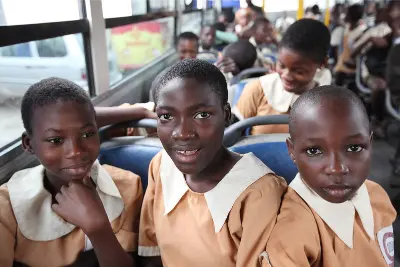Nigeria is experiencing a complete breakdown in order.
Armed men have kidnapped 15 pupils from a boarding school in northwestern Nigeria just days after more than 280 students were abducted from another school by a gang in northern Kaduna state.
The men broke into the Islamic seminary in the village of Gidan Bakuso in Sokoto state on Saturday and seized 15 children from the hostel as they slept, according to police.
According to Al-Jazeera, while Nigeria’s President Bola Tinubu ordered security forces to pursue the attackers, the military has been hampered by a multitude of crises across Africa’s most populous country and is spread thin, and local vigilante groups are not enough of a bulwark against the armed gangs.
Kidnappings are common in northwestern and central Nigeria where criminal gangs occupying vast, remote forests terrorize residents. Known as bandits, these groups loot villages, and kill and kidnap residents, especially students, for huge ransoms.
Some 1,400 children have been abducted in Nigeria since 300 girls were taken from the northeastern town of Chibok in 2014, sparking widespread international condemnation. Attackers also took 150 children in Kaduna in July 2021, the previous major abduction. The students were reunited months later after their families paid ransoms.
Nigeria, Africa’s most populous country and largest economy, is currently navigating through a myriad of challenges and developments across various sectors, from security and legislative reforms to economic and social issues. These recent kidnappings and other reports of violence highlight the complex situation the nation faces, underscoring the efforts by the government and other stakeholders to address these concerns.
Security remains a top concern in Nigeria, with these recent incidents painting a stark picture of the challenges the nation faces. The National Drug Law Enforcement Agency (NDLEA) recently seized over 5.2kg of cannabis sativa and opioids in Osun State, showcasing the ongoing battle against drug trafficking. The persistent threat of terrorism and banditry is unnerving to citizens as they feel little is being done to resolve the issue. Additional reports of gunmen attacking in Sokoto and Imo State further emphasize the security dilemma.
However, while citizens are right to be worried, the government and legislative bodies are taking steps to combat these serious threats and challenges. The ongoing amendment to the NDLEA Act aims to strengthen the fight against substance abuse and illicit drug trafficking.
Regardless, these legislative efforts are not without controversy, as a proposal requiring over 50% of votes for presidential and governorship wins was rejected, sparking debates on electoral reforms. Moreover, the government’s ban on leave of absence for health workers, known as “Japa,” is an attempt to address the healthcare sector’s workforce challenges amidst broader societal impacts.
Nigeria’s economic and social sectors are under significant strain. The power sector’s woes continue, with electricity generation dropping drastically, impacting businesses and everyday life. Yet, there’s a glimmer of hope as Goldman Sachs predicts the Naira will appreciate in the coming months. The food crisis in the North-East, leading to the looting of warehouses and food trucks, highlights the severe food security issues facing parts of the country.
The National Centre for Disease Control (NCDC) faces challenges in tackling diseases, signaling ongoing public health struggles. Additionally, the cost of a healthy diet has become increasingly unaffordable for many Nigerians, further exacerbating the nation’s nutritional challenges.
Nigeria’s current landscape is a testament to its resilience and the complex challenges it faces. The government, along with local and international partners, is making efforts to address these issues, from security to economic reforms. However, the path forward requires continued dedication, innovative solutions, and a commitment to addressing the underlying causes of Nigeria’s challenges.
The nation’s future depends on the collective efforts of its people and leaders to navigate these turbulent times and pave the way for a more stable and prosperous Nigeria.
